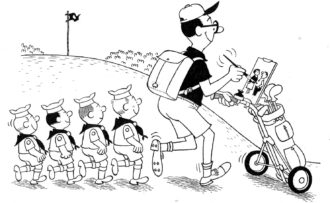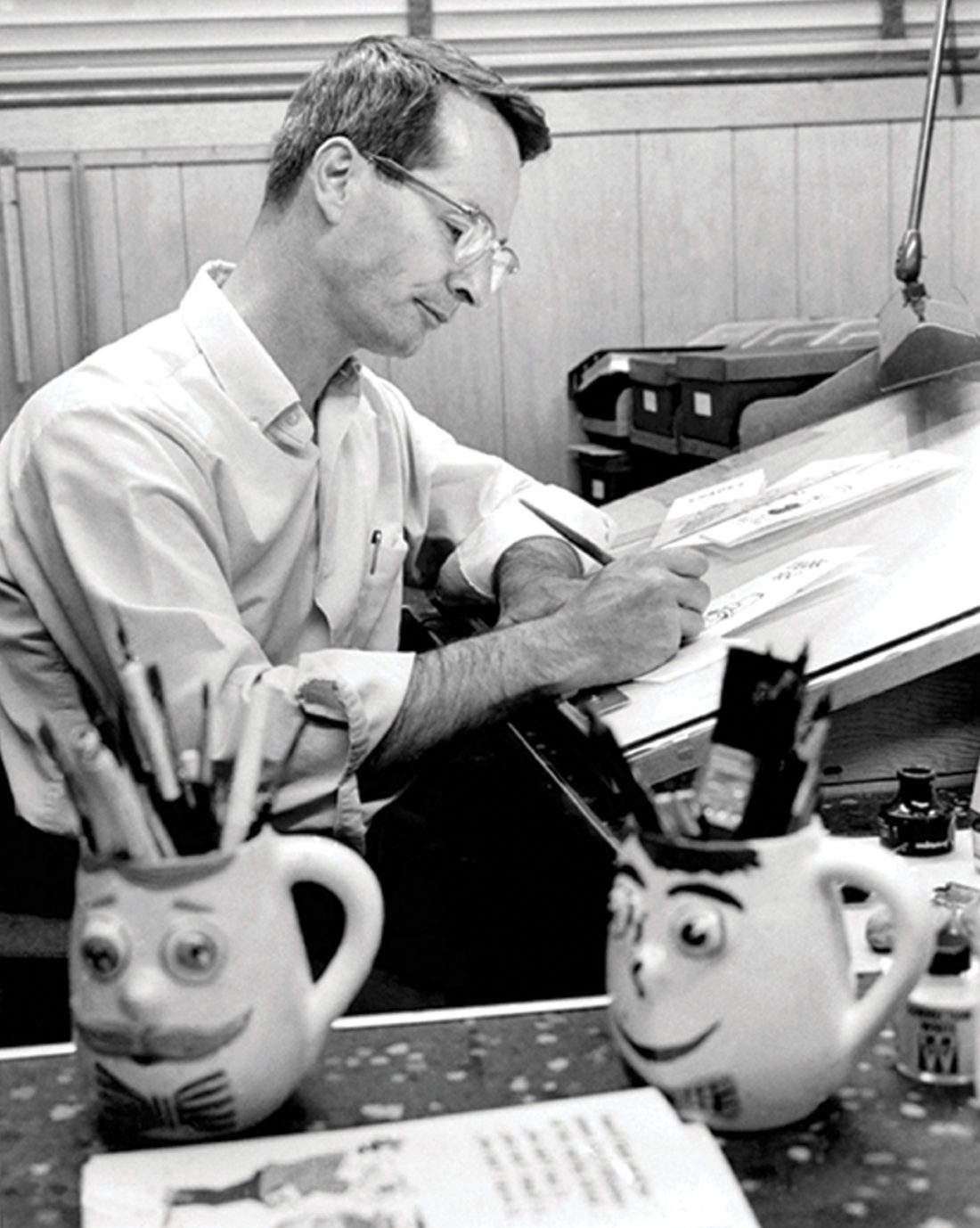Father’s Day has come and gone, during which millions of greeting cards were exchanged to commemorate the impacts that dads have made in people’s lives.
Though local entrepreneur Greg Harrison‘s father, Bill, a distinguished illustrator, passed away 20 years ago, the late artist’s legacy lives on through his son’s new business, Harrison Greetings, which Greg hopes will introduce his father’s work to the current Buncombe County community through, appropriately enough, greeting cards.
Portrait of the artist
Born in Asheville in 1927, Bill attended UNC Chapel Hill in the late 1940s, when his humorous illustrations adorned the covers and pages of the campus comic publication, Tarnation, poking fun at university and community life. Meanwhile, his far more reverent portraitures of the school’s football players wound up on the front of the game programs.
“He was also responsible for the stadium trick where people would have a card underneath their seat and they would hold it up and spell something out,” Greg says.
After graduating in 1949, Bill returned to Asheville and began working as a full-time cartoonist. His single-panel illustrations appeared in Life, The Saturday Evening Post, Boys’ Life, Parade, Collier’s, Look Magazine and other publications. And his “Guess Who” series was syndicated in newspapers across the country via the Chicago Sun-Times syndicate.
“He was very good with domestic situations and family stuff,” Greg says.

In 1953, Bill was honored as one of the top 15 most prolific cartoonists in the U.S., and throughout that decade, his works were regularly selected for the annual Best Cartoons of the Year anthology, where Charles Schultz, Mort Walker (Beetle Bailey) and other household names were featured.
The illustration that Greg feels best sums up his father during that time is a self-portrait of Bill on a golf course. Though the links were the elder Harrison’s primary form of recreation, he often had to balance the game with his other responsibilities. And in this cartoon, he’s not only working on a panel while pushing his golf bag to the next hole, but doing so with his then-four sons walking right behind him.
With a fifth son soon on the way and the family budget already stretched thin to meet the needs of everyone in their Malvern Hills home, Bill looked to improve his financial situation while still making a living through his art. Fortunately for him, an increasing number of churches and community groups began hiring him to design fliers and publications, and as he saw his work impact people beyond the comic pages, inspiration struck.
“I imagine he was like, ‘The grocery bill is getting kind of high,’” Greg says with a laugh. “So, he started a greeting card company.”
Getting down to business
In 1959, Bill founded Harrison Publishing Co. on Church Street. Using his distinctive character designs, he created a wide range of options from holiday and special occasion cards to what he called “customer cards” — direct mail marketing for businesses that salespeople, real estate agents and other professionals would use to sustain contact with existing clients and introduce themselves to potential new ones.
“If you’re an insurance guy and you’ve got 200 people on your mailing list, you’re going to send all of them birthday cards so they remember you,” Greg says. “So it was really customer retention and customer relationship management through mail.”
All of these designs were printed on the tall, skinny pieces of paper known as “studio cards.” Due to their unusual size, the card stock was the cheapest option, which made them a favorite of such underground comics as R. Crumb (Fritz the Cat) and therefore gave them an alternative edge that made them stand apart even more from standard greeting cards. But in each case, Bill’s creations remained the true stars.
“Everything that he did was with a crow quill pen and a Higgins bottle of ink — and he was a real master at that pen work,” Greg says. “He developed this style which is very exaggerated caricature but very friendly and grabbed your attention. People started buying the cards by the thousands.”
As demand grew to customers in all 50 states as well as internationally, Harrison Publishing Co. moved to 624 Patton Ave. and had a print shop on-site. Greg says that all five of the Harrison boys worked there at some point, and his brother Tim wound up running the company for over a decade.
Bill’s health struggles, combined with the popularity of online communications, contributed to the company’s closure in 2003. That same year, Bill passed away at the age of 76, and though his name may not be as well-known as the family wishes, the launch of Harrison Greetings, which uses Bill’s designs, seems destined to change things.
In good hands
When it comes to candidates to carry on Bill’s legacy, Greg is about as ideal as they get. Following in his father’s artistic footsteps, Greg graduated from Virginia Commonwealth University’s School of Design and moved to New York City to work for Broadcast Arts, which produced “Pee-wee’s Playhouse.” Greg designed, built and performed Pee-wee’s robot, Conky 2000, and went on to design and direct music videos, ads and series for MTV, Nickelodeon and Comedy Central.

Greg’s music video credits include production design on DJ Jazzy Jeff and The Fresh Prince’s “Parents Just Don’t Understand.” Later, when Will Smith developed “The Fresh Prince of Bel Air” sitcom for NBC, Greg was brought on as a collaborator. In the show’s opening credits, the graffiti behind Smith as he spins around in a throne is Greg’s handiwork.
His production design credits grew over the two subsequent decades after moving to Los Angeles, working primarily for MTV and Nickelodeon. But the opportunity to start Harrison Greetings, spend time with his numerous Asheville-area relatives and, perhaps most importantly, have regular access to “authentic sweet tea and pulled pork barbecue” after a 20-year absence, brought him back east.
Since returning to Asheville and quietly launching the Harrison Greetings’ website in late December, he’s been operating out of his home office just outside downtown. There, he’s busy scanning his father’s vast collection of designs, all of which have been well archived and preserved, and making them available for orders.
In addition to choosing from preexisting cards, people can customize their own greetings using Bill’s classic characters and the multiple distinct hand-drawn alphabets that he developed. Greg has gone through his father’s library, digitized each letter and is working on presenting them as digital font sets — one of several product extensions in the works, including wrapping paper and T-shirts. Greg is also on the lookout for galleries or quirky spaces to potentially hold an exhibition of Bill’s work and more fully reintroduce his art to the Asheville community that he was part of his entire life.
“What my dad did in terms of the type of cartooning he did, the lettering, the dedication he had to create his funny characters, I wanted to get them back out and and let people see them again,” Greg says.
“The other thing that’s driving me is that tactile experience, which you don’t get with digital. In the middle of all this deluge of what we get every day, if you get something you can hold — if somebody goes to the trouble of sending a card, it stands out. People love picking up a vinyl record and looking at it and feeling it, so it seems to be merging with that sensibility at the same time. I guess that’s just kind of serendipitous.”
To learn more, visit avl.mx/crl.



Before you comment
The comments section is here to provide a platform for civil dialogue on the issues we face together as a local community. Xpress is committed to offering this platform for all voices, but when the tone of the discussion gets nasty or strays off topic, we believe many people choose not to participate. Xpress editors are determined to moderate comments to ensure a constructive interchange is maintained. All comments judged not to be in keeping with the spirit of civil discourse will be removed and repeat violators will be banned. See here for our terms of service. Thank you for being part of this effort to promote respectful discussion.